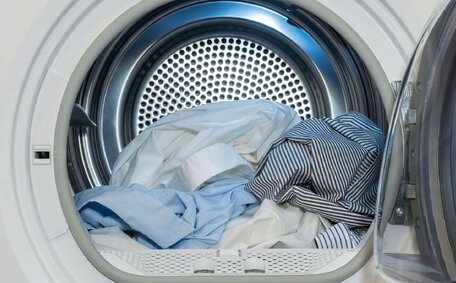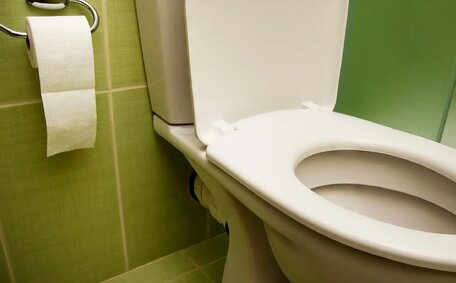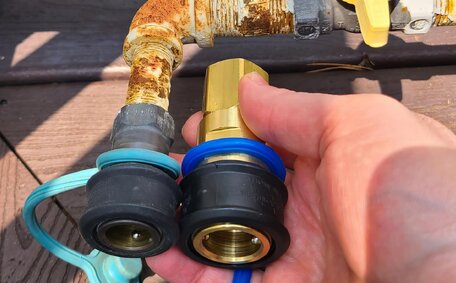Recognizing a plumbing emergency
A plumbing emergency refers to any urgent issue with your plumbing systems that requires immediate action to prevent damage or harm. Common scenarios where you need to shut off water highlight typical plumbing emergencies and their potential damage:
- Burst pipes or water leaks - Addressing this situation immediately can prevent rapid flooding and water damage.
- Blocked drains or sewer lines - Drains that back up can overflow sewage into your home, which can cause unhealthy and unsanitary conditions.
- Gas leaks - Natural gas leaks are extremely dangerous and require immediate attention as they can cause damage with explosion risks and also severe health threats.
- Malfunctioning water heater - Not having hot water, which may necessitate turning off your hot water system, can disrupt daily activities.
- Running or constantly flushing toilet - One of the most common plumbing issues that wastes water and can damage your finances by driving up the water bill.
- Strange noises from pipes - Odd gurgling or hammering sounds may indicate larger problems ahead.
If such troubles arise, promptly shut off your main water supply and engage a plumber who can assess and remedy the situation swiftly. Delaying action may worsen damage or compromise plumbing safety, so promptly contacting a local plumber is advised. Remain calm, turn off the main water supply, and promptly call a plumber for urgent assistance.
Immediate safety actions
When attempting to handle a plumbing emergency, your first priority is maintaining composure and assessing the safety of the affected area.
Make sure your valuables are safe by relocating them to protect from water damage. Place containers under leaks from a burst pipe to catch water and reduce spread after you shut off water supply. Turn off main water via the shutoff valve to minimise the risks of flooding.
For electrical safety, quickly act if water comes into contact with outlets or appliances. Shut off power to those areas of the home. Check for gas leaks too, as a gas leak can damage your home, indicated by a rotten egg smell - if found, evacuate immediately and contact the gas company.
While awaiting a professional plumber, avoid using tools if you lack the required expertise. This can worsen damage. Mop up accessible water to minimise damage and open windows to air out the property.
Shutting off the main water supply
In a plumbing emergency, the first critical step is to locate and shut off the water at the main valve. This precautionary measure acts to prevent any additional water from entering the system and worsening flooding or leakage issues.
Here are some fundamental steps to take:
- Find the main water shutoff valve and turn off the water to your residence - typically found near the front external wall or the point where the water line makes its entry.
- The valve often resembles an outdoor tap; ensure you correctly identify the main valve before attempting to shut it off.
- To turn off your water, turn the valve clockwise until tight and resistant to turning further.
- Flush all toilets once to drain stored tank water, especially useful in situations like dealing with frozen pipes. Turn on taps to drain lines. Water should stop flowing, confirming main supply is off.
- Leave the main water valve off until a plumber evaluates the emergency. Avoid restoring water yourself if unsure.
With the main shutoff valve closed, aim to contain any remaining leaks as effectively as possible. Open doors and windows to ventilate and use fans if available.
Contact a licenced emergency plumber immediately so necessary plumbing repair work can be diagnosed and resolved. Avoid tackling a plumbing issue without understanding the problem, as this could worsen the damage.
Avoiding electrical hazards
Water can pose a dangerous combination with electricity during plumbing emergencies. Apply these plumbing safety tips to prevent electrical hazards:
- Switch off power at the main circuit breaker if water contacts any electrical outlets, or if you suspect carbon monoxide leakage alongside appliances or wiring.
- Unplug appliances, including your garbage disposal, near leak areas and do not use electrical items where you can use alternative methods.
- Don footwear with rubber soles as part of your essential safety measures against electric shocks when wading in water.
- When employing electric pumping equipment to remove floodwater, ensure to turn off water in the area, connect to a GFCI outlet, and avoid stepping into the water.
- Ensure to turn off water supply before letting a professional electrician handle any repairs to electrical systems affected by water.
Turning off electricity to flooded areas mitigates electrical risks and, by using insulated footwear, helps prevent electrocution or shock hazards until experts can intervene.
Essential emergency plumbing kit
Having a dedicated plumbing first aid kit on hand can make a significant difference when emergencies can strike without warning. Key contents to include are:
- Plunger - essential for tackling a blocked drain or toilets.
- Buckets - useful for catching leaking water and reducing mess or damage.
- Old towels or rags - helpful for drying surfaces and to clean up spillages.
- Basic tool kit (wrenches, pliers, screwdrivers) - potentially useful in temporarily stabilising leaks until a professional plumber attends.
- Headlamps or torches - Crucial for providing hands-free lighting in unlit areas when addressing issues.
- Water pump - redirects or syphons small accumulations of water to outside areas.
It’s wise to place the emergency kit in a convenient spot like the garage or laundry to minimize damage during unforeseen events. This enables promptly locating supplies when urgently needed. Additional recommended items include pipe sealant tape, cleaning agents, and protective equipment such as safety glasses and gloves, along with spare parts like washers or valves.
By preparing this vital kit, your initial actions can undoubtedly go a long way towards mitigating a plumbing crisis until our team of licenced professionals arrives to make repairs.
Safety equipment
When it comes to plumbing emergencies, be sure to wear appropriate safety equipment to protect yourself from injury.
Your safety kit should include:
- Protective gloves - make sure to guard hands from sharp objects or hazardous materials when clearing drains or handling pipes.
- Safety goggles - Protect your eyes from contact with escaped pressurised water or splashing sewage.
- Respiratory masks - Prevent inhalation of dangerous sewer gas fumes.
- Hard hats -
It’s important to utilise other protective gear or tools including ear plugs to muffle loud equipment noise and closed-toe shoes for site stability. Duct tape can also temporarily seal cracked piping as an unexpected emergency fix until repairs are made.
With appropriate safety equipment and basic stabilising solutions, you’re better prepared to respond confidently to plumbing emergencies while waiting for professional assistance.
Handling leaks and clogs
Avoid attempting repairs on leaks or clogged drains without the necessary plumbing expertise. While waiting for a professional, use items from the emergency kit to help minimise damage.
For leaks, place buckets or containers under the leak to catch water and remove any accumulations. Employ towels or rags to soak up any pooling water. Duct tape can temporarily wrap cracked sections of pipe as an emergency patch until repairs are made.
For clogged sinks or drains with standing water, use a plunger to try clearing the blockage and restore flow. Use a consistent, direct downward force, being careful not to harm the pipes. Alternatively, a drain snake can reach deeper obstructions - feed the hooked end into the drain and crank handle to work through debris.
Exercise caution when using plumbing equipment to prevent injury or further complications. Materials contaminating sinks and drains may be hazardous if contacted unprotected. For risk-free, durable solutions, call on the expertise of a licenced plumber as soon as possible.
Seeking professional help
When it comes to plumbing emergencies, it’s crucial to contact a qualified, licenced plumber who can handle plumbing issues as soon as possible to prevent further damage. Attempting DIY fixes without proper expertise can often exacerbate issues and cause severe property damage or personal injury.
Our squad of residential plumbing specialists are at your service 24/7 to deliver prompt, effective resolutions, ensuring peace of mind for your home and family. Our extensive experience allows us to assess and resolve a range of urgent plumbing issues. By leveraging our advanced techniques, high-quality equipment and extensive technical knowledge, we can accurately diagnose issues and carry out lasting repairs.
For emergency plumbing services, contact us at 1300 349 338 or jobs@rydeplumbingservices.com.au. We always aim to respond within the hour, day or night, to safeguard your home. Our skilled technicians will address any active leaks, clear blocked drains, repair burst pipes, restore your water heater functionality, and prevent contamination, ensuring the wellbeing of your home and family.
We also take safety extremely seriously. Our insured staff operate safely, ethically, and tidily, with uniform and protective gear. You can have confidence entrusting your plumbing emergencies to our capable team.
For serious plumbing issues, don’t delay; early intervention is crucial for effective resolution before significant damage occurs. Call us any time for priority service from Sydney’s leading emergency plumbers.
Preventing future emergencies
Being proactive is key to preventing plumbing emergencies. Implement regular maintenance checks and respond promptly to early warning signs of problems:
- Inspect pipes routinely for corrosion and leaks. Repair minor drips before they worsen.
- Flush drains weekly with hot water to clear sediment and avoid obstructions.
- Check toilet valves, taps and water pressure annually. Replace worn washers, valves and fittings.
- Have a professional assess water heaters, including cleaning drain lines with cameras and conducting biennial pressure tests of gas pipelines.
installing new fixtures and appliances, Consider installing leak detection devices that trigger automatic water shutoff.
Keep your local plumber’s number handy in case issues do still arise unexpectedly. A swift response limits damage and enables faster restoration. Proactive maintenance and early intervention can reduce the likelihood of plumbing emergencies.
Inspecting pipes and fittings
Taking proactive steps like regular inspection of your pipes and connections is essential to save time, money, and prevent costly repairs, effectively shielding your Ryde residence against plumbing adversities. Conduct physical checks on exposed pipes twice a year for signs of corrosion, cracks, or leaks. In addition, schedule annual inspections of concealed plumbing by our qualified technicians.
We thoroughly assess pipe integrity with non-destructive methods. This proactive monitoring can prevent issues that might otherwise become major failures or cause water damage. It also evaluates if pipes and fittings meet current safety codes and capacity demands.
Older galvanised steel pipes, which may give rise to major plumbing concerns, often corrode and hinder water flow over time. We help determine if replacement is needed for reliable service. Likewise, loose fittings, mineral deposits and accumulated debris reduce functionality, which we identify through comprehensive inspections.
Don’t delay when facing emergency leaks or bursts - call your plumber on 1300 349 338 for a prompt pipe assessment. Safeguard your property and finances with planned maintenance.
Maintaining drains
Regular maintenance of your water supply is essential to prevent any further blockages and avoid emergency callouts. Follow these useful tips:
- Pour a kettle of hot water down sinks and drains weekly to clear grease, soap scum and other debris.
- Monthly use a plastic drain snake to manually clear hair and buildup from pipes.
- Add a cup of baking soda and vinegar down drains monthly to react with grime and dissolve buildups.
- Steer clear of introducing fats, oils, or chemical drain cleaners into your drains as these tend to solidify and provoke clogs.
- Install fine mesh drain strainers to capture food scraps and particles that could clog your sewer line.
- Consider professional drain inspections and cleans annually to maintain flow and integrity.
Understanding and consistently caring for your drains can help prevent plumbing problems and make repair efforts more effective.






